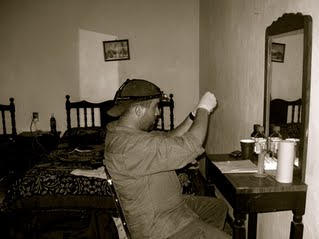 My research centers on the patterns and processes of mammalian diversity, focusing primarily on the effects of hybridization on the species boundary. In doing such, I incorporate fieldwork and a strong laboratory component (i.e., karyotyping, Sanger sequencing, fragment analysis, and next-generation sequencing) to examine these questions. As a mammalogist and an evolutionary ecologist, I collect voucher specimens and associated tissues for ongoing research. These specimens and tissue samples are deposited in accredited natural history collections and made available to the research community. To date, I have worked in the states of Iowa, Kansas, Michigan, Missouri, Nebraska, New Mexico, Oklahoma, Texas, and internationally in Mexico, resulting in well over a year in the field and thousands of specimens deposited in natural history collections.
My research centers on the patterns and processes of mammalian diversity, focusing primarily on the effects of hybridization on the species boundary. In doing such, I incorporate fieldwork and a strong laboratory component (i.e., karyotyping, Sanger sequencing, fragment analysis, and next-generation sequencing) to examine these questions. As a mammalogist and an evolutionary ecologist, I collect voucher specimens and associated tissues for ongoing research. These specimens and tissue samples are deposited in accredited natural history collections and made available to the research community. To date, I have worked in the states of Iowa, Kansas, Michigan, Missouri, Nebraska, New Mexico, Oklahoma, Texas, and internationally in Mexico, resulting in well over a year in the field and thousands of specimens deposited in natural history collections.
 QUESTIONS OF INTEREST
QUESTIONS OF INTEREST
- What ecological factors facilitate species formation?
- Why do “good species” hybridize and still maintain the integrity of their genome?
- What are the conservation implications of hybridization on sensitive taxa?
- How does historical biogeography affect current mammalian taxa
- How do anthropogenic changes to the environment, including climate change, affect mammal populations?
- What ways can natural history collections be utilized with ongoing technological advances?

